
"I Can't Get Next to You" is a 1969 No. 1 single recorded by the Temptations and written by Norman Whitfield and Barrett Strong for the Gordy (Motown) label. The song was a No. 1 single on the Billboard Top Pop Singles chart for two weeks in 1969, from October 18 to October 25, replacing "Sugar, Sugar" by the Archies and replaced by "Suspicious Minds" by Elvis Presley. The single was also a No. 1 hit on the Billboard Top R&B Singles for five weeks, from October 4 to November 1, replacing "Oh, What a Night" by the Dells, and replaced by another Motown song, "Baby I'm For Real" by the Originals.
"Pledging My Love" is a blues ballad. It was written by Ferdinand Washington and Don Robey and published in 1954.

"Leaving on a Jet Plane" is a song written and recorded by American singer-songwriter John Denver in 1966, originally included on his debut demo recording John Denver Sings as "Babe I Hate to Go". He made several copies and gave them out as presents for Christmas of that year. Denver's then producer Milt Okun convinced him to change the title; the song was renamed "Leaving on a Jet Plane" in 1967.

"I'll Never Fall in Love Again" is a popular song by composer Burt Bacharach and lyricist Hal David that was written for the 1968 musical Promises, Promises. Several recordings of the song were released in 1969; the most popular versions were by Dionne Warwick, who took it to number 6 on Billboard magazine's Hot 100 and spent three weeks topping the magazine's list of the most popular Easy Listening songs, and Bobbie Gentry, who topped the UK chart with her recording and also peaked at number 1 in Australia and Ireland, number 3 in South Africa and number 5 in Norway.

The Cuff Links were an American rock/pop studio group from Staten Island, New York, United States. The ostensible band had a US No. 9 hit in 1969 with "Tracy", with rich harmonized vocals provided entirely by Ron Dante. The track was produced as part of a series of recording sessions – sometimes as many as six in a day – by Dante, with the songs released under a variety of band names. Dante left the act after their first album; on later singles vocals were provided by Joey Cord and/or Rupert Holmes.
"Catch a Falling Star" is a song written by Paul Vance and Lee Pockriss. It was made famous by Perry Como who recorded and released his version in late 1957.

"Run Joey Run" is a teenage tragedy song performed by soft rock singer David Geddes. It was a US Top 40 hit which peaked at No. 4 on Billboard's Hot 100 Chart in the fall of 1975, and hit No. 1 on the Cashbox Magazine's Top 100. It would be Geddes' biggest hit. He made it into the Top 40 one other time with "The Last Game of the Season ."

"Morning Side of the Mountain" is a song written by Larry Stock and Dick Manning and first recorded in 1951 by Tommy Edwards. It settled at #24 on the pop chart. Edwards re-recorded it in 1959, reaching #27 on the Billboard Hot 100. The re-release was featured as the B-side of Edwards' other hit, a cover of Johnnie Ray's 1952 success, "Please Mr. Sun."

Portrait of Johnny is a compilation album by Johnny Mathis that was released by Columbia Records on July 17, 1961, and described on the cover as "The Third in the Johnny Mathis Greatest Hits Series". Seven B-sides of chart hits are included along with four of the corresponding A-sides that made it onto the Billboard Hot 100 or "bubbled under" it and one song from a single that had neither side chart in Billboard magazine.
"Chains Of Love", a 12-bar blues, was written by Doc Pomus.
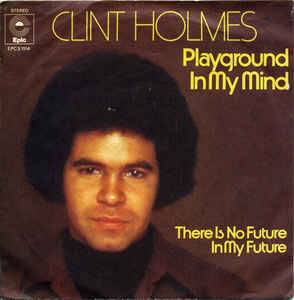
"Playground in My Mind" is a 1972 single by Clint Holmes. It was written by Paul Vance with Lee Pockriss, and is a nursery rhyme-styled song which features a duet with record producer Vance's seven-year-old son Philip, who sang on the chorus, as Michael.
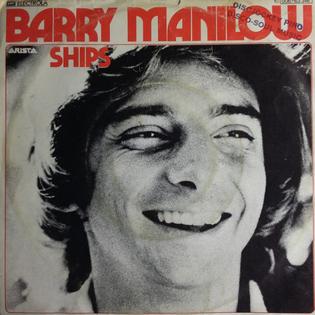
"Ships" is a song written and originally performed by British musician Ian Hunter. The song was first released on Hunter's fourth solo album, You're Never Alone with a Schizophrenic in March 1979, and later released as a single in August 1979. Hunter's release of the single never made the charts. The song is said to be about Ian's relationship with his father.

"Stormy" is a hit song by the Classics IV released on their LP Mamas and Papas/Soul Train in 1968. It entered Billboard Magazine October 26, 1968, peaking at #5 on the U.S. Billboard Hot 100 chart and #26 Easy Listening. The final line of the chorus has the singer pleading to the girl: "Bring back that sunny day". The single, along with the prior release of "Spooky" and, soon after, the release of "Traces", formed a trio of solid hits for the band.
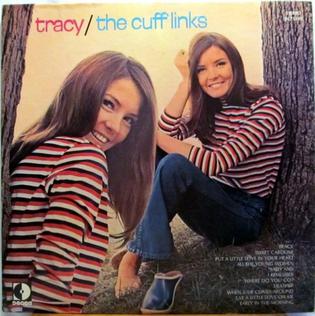
"Tracy" is a song written by Lee Pockriss and Paul Vance, the title track of the Cuff Links debut LP.

"Sweet Mary" is a song written by Steve Jablecki and performed by Wadsworth Mansion. "Sweet Mary" was featured on their 1971 album Wadsworth Mansion and was produced by Jim Calvert and Norman Marzano.

"A Little in Love" is a song recorded by Cliff Richard, released as the second single from his 1980 album, I'm No Hero.

"Early in the Morning" is a song by British band Vanity Fare, released as a single in June 1969. It became an international hit, peaking at number 8 on the UK Singles Chart and number 12 on the Billboard Hot 100 and was awarded a gold disc for sales over one million.

"Any Way That You Want Me" is a song written by Chip Taylor that was first released in September 1966 by Tina Mason as the B-side to her single "Finders Keepers". It has been covered by a number of artists, with the most successful version being by English rock band the Troggs.
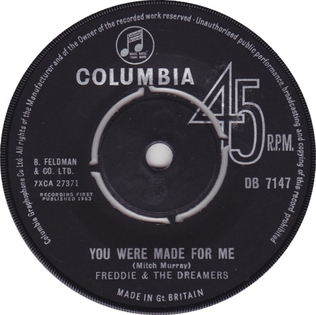
"You Were Made for Me" is a song by the English band Freddie and the Dreamers, released as a single in November 1963. It peaked at number three on the UK Singles Chart.
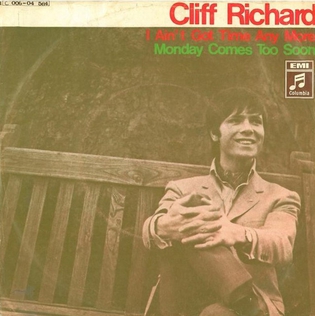
"I Ain't Got Time Anymore" is a song by the British singer Cliff Richard, released as a single in August 1970. It peaked at number 21 on the UK Singles Chart.

















